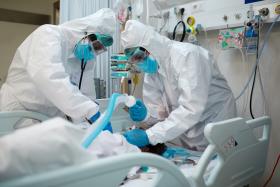
UPMC Hamot 2021 Critical Care & Emergency Medicine Conference
Join your colleagues and gain the latest updates in critical care and emergency medicine!
This activity has been designed to increase the participant’s critical thinking and knowledge of some common and not-so-common challenges in critical care and emergency medicine. Specific topics were selected based on challenges faced almost daily in critical care and emergency patient care, as well as ongoing and emerging health care concerns and trends. Ample time for questions and answers has been built in to each presentation. Audience members will also have the opportunity to speak one-on-one with presenters during refreshment breaks and lunch.
Target Audience
Critical care and emergency medicine physicians, nurses, advanced practice providers, and pre-hospital personnel, as well as primary care practitioners with an interest in trauma and emergency medicine will benefit from attendance at this activity.
Learning Objectives
At the conclusion of this activity, the participants should be able to:
- Discuss the management of noninvasive ventilation in acute respiratory failure
- Review indications of noninvasive ventilation
- Review contraindications and troubleshooting of noninvasive ventilation
- Discuss evidence on normal saline vs balanced fluids in emergency medicine and critical care
- Summarize the pros and cons of saline vs fluids in different patients
- Describe the application of vasopressor and inotrope physiology
- Identify clinical indications of certain vasopressors and inotropes
- Review clinical evidence behind indications for vasopressors and inotropes
- Review the pathophysiology of vaping and the effects on the lungs
- Discuss best management practices for those suspected to have EVALI
- Recognize the clinical characteristics of ARDS
- Discuss the appropriate management of patients with ARDS
- Describe identification and treatment for bleeding, platelet, and white blood cell disorders
- Review key considerations for selection of blood transfusion products with decreased risk of harm for severely immunosuppressed patients
- Discuss treatment strategies for emergent malignancy complications, including neutropenic fever, spinal cord compression, pericardial effusion, and several common syndromes
- Compare and contrast management styles in the emergency room vs ICU
- Describe best practices for patient transfer from the emergency department to the ICU
- Identify hyperglycemic crisis in the ER and ICU
- Describe pearls and pitfalls in the management of the hyperglycemic crisis
- Recognize the signs and symptoms of elevated ICP
- Discuss the best management practices for ICP crisis in the ED and ICU settings
Additional Information
| Attachment | Size |
|---|---|
| 736.42 KB |
8 - 8:05 | Introduction | |
8:05 – 8:35 | Noninvasive Ventilation | Ronaldo Sevilla Berrios, MD |
8:40 – 9:20 | Balanced Versus Un-Balanced Crystalloids in Critical Care | Venu Velagapudi, MD |
9:25 – 10:05 | Vasopressors Inotropes in Shock | Carlos Racedo Africano, MD |
10:10 – 10:25 | Break/Exhibit Hall | |
10:25 – 10:55 | Modern Quandaries in Pulmonary Medicine | Stephen Kovacs, DO |
11 – 11:30 | ARDS & Rescue Therapy | Heidi Storer, DO |
11:35 – 12:05 | ICP Crisis Management | Logan Pyle, DO |
12:10 – 12:45 | Break/Exhibit Hall | |
12:45 – 1:45 | “How I Manage” Panel Discussion | Ronaldo Sevilla Berrios, MD; Christopher Cammarata, DO; Jonathan Miller, MD; Carlos Racedo Africano, MD |
1:45 – 2:15 | Transition of Care: ED to ICU | Lauren Whitman, BSN |
2:20 – 2:35 | Break/Exhibit Hall | |
2:35 – 3:15 | Hyperglycemic Crisis (DKA) | Katie McGuire, PA-C |
3:20 – 3:50 | Hematologic Oncology | David Seastone, DO, PhD |
3:55 | Closing Remarks, Adjournment | |
DUE TO THE COVID-19 PANDEMIC, THE CONFERENCE WILL BE HELD VIRTUALLY, THROUGH ZOOM.
Pre-registrants will be sent links prior to the conference, and all links will be available on the conference website for those who have registered.
All presentations will be taking place live eastern standard time (EST)
COURSE DIRECTORS:
Kristin Juhasz, DO
Core Faculty
Emergency Medicine Residency Program
Department of Emergency Medicine
UPMC Hamot
Carlos J. Racedo Africano, MD
Associate Director of Critical Care
Director of Critical Care Education, Research and Outreach
UPMC Hamot
FACULTY:
Ronaldo Sevilla Berrios, MD
Department of Critical Care/Intensivists
UPMC Hamot
Christopher Cammarata, DO
Department of Emergency Medicine
UPMC Hamot
Stephen Kovacs, DO
Department of Pulmonology
UPMC Hamot
Katie McGuire, PA-C
Supervisor, APP
Department of Critical Care/Intensivists
UPMC Hamot
Jonathan Miller, MD
Department of Emergency Medicine
UPMC Hamot
Logan Pyle, DO
Director of Neurocritical Care
UPMC Hamot
David Seastone, DO, PhD
Department of Oncology
UPMC Hamot
Heidi Storer, DO
Chief Pulmonary Critical Care Fellow
LECOM Health at Millcreek Community Hospital
Venu Velagapudi, MD
Department of Critical Care and Nephrology
Yale - New Haven Hospital
Lauren Whitman, BSN
Department of Trauma/Neuro ICU
UPMC Hamot
ACCREDITATION
In support of improving patient care, the University of Pittsburgh is jointly accredited by the Accreditation Council for Continuing Medical Education (ACCME), the Accreditation Council for Pharmacy Education (ACPE), and the American Nurses Credentialing Center (ANCC), to provide continuing education for the healthcare team.
Physician (CME)
The University of Pittsburgh designates this live activity for a maximum of 6.0 AMA PRA Category 1 Credits™. Physicians should claim only the credit commensurate with the extent of their participation in the activity.
AOA Category 1-A Credit
The Philadelphia College of Osteopathic Medicine is accredited by the American Osteopathic Association to provide osteopathic continuing medical education for physicians. The Philadelphia College of Osteopathic Medicine designates this program for a maximum of six hours of AOA Category 1-A credits and will report CME and specialty credits commensurate with the extent of the physician's participation in this activity
Nursing (CNE)
A maximum of 6.0 nursing contact hours will be awarded. Participants will be able to claim credit commensurate with the extent of their participation in the program.
PHYSICIAN ASSISTANT (AAPA)
The University of Pittsburgh has been authorized by the American Academy of PAs (AAPA) to award AAPA Category 1 CME credit for activities planned in accordance with AAPA CME Criteria. This activity is designated for 6.0 AAPA Category 1 CME credits. PAs should only claim credit commensurate with the extent of their participation.
Trauma Credit Hours
Select sessions meet the requirements for trauma education hours. The maximum trauma education credit available for this conference is 1 hour.
Prehospital Continuing Education Credits
Continuing education credits for prehospital emergency medicine services personnel have been applied for.
Other Healthcare Professionals
Other health care professionals will receive a certificate of attendance confirming the number of contact hours commensurate with the extent of participation in this activity.
Available Credit
- 6.00 AAPA Category I CME
- 6.00 AMA PRA Category 1 Credit™The University of Pittsburgh School of Medicine is accredited by the Accreditation Council for Continuing Medical Education to provide continuing medical education for physicians.
- 6.00 ANCCUPMC Provider Unit is accredited as a provider of continuing nursing education by the American Nurses Credentialing Center’s Commission on Accreditation
- 6.00 Attendance
Price
UPMC EMPLOYEE PAYMENT VIA JOURNAL ENTRY TRANSFER OR MEB SCHOLARSHIP FUNDS
If you are a UPMC employee and your department will be responsible for payment, we can charge your department directly.
DO NOT SUBMIT a disbursement to UPMC Accounts Payable.
For journal transfer and MEB funds, please fill out the appropriate form below:
![]() MEB Tracking Form reviewed 7-6-2020.pdf
MEB Tracking Form reviewed 7-6-2020.pdf
Cancellation policy
Please notify UPMC Hamot’s CME Department of substitutions and cancellations, via email to [email protected] or by telephone at 814-877-5691.
IF YOU ARE REQUIRED TO PAY BY CHECK
Please contact the UPMC Hamot CME Department at: 814-877-5691 or e-mail: [email protected].

 Facebook
Facebook X
X LinkedIn
LinkedIn Forward
Forward
